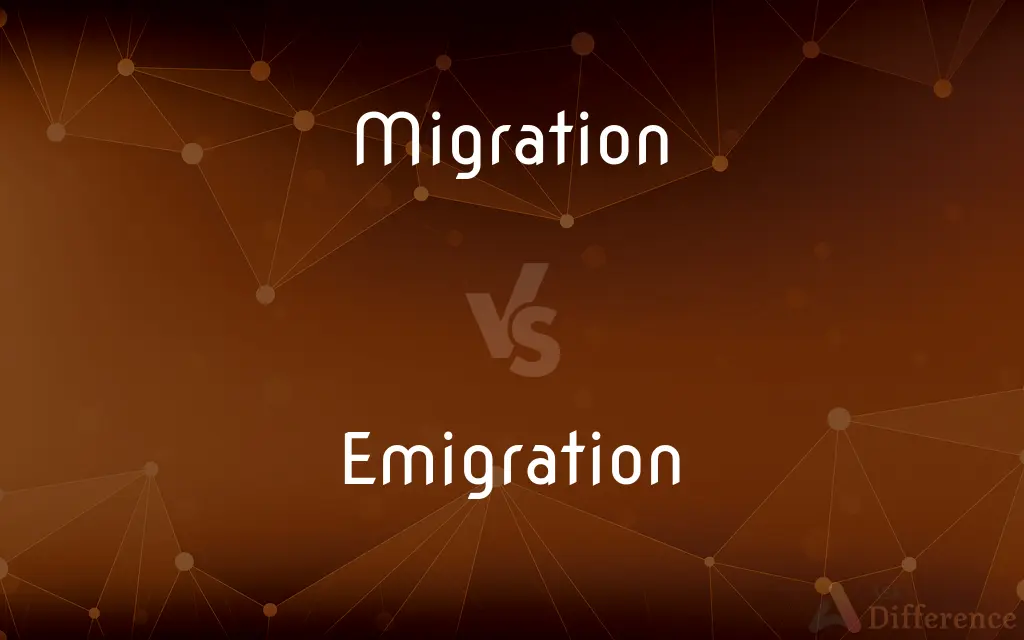Migration vs. Emigration — What's the Difference?
Edited by Tayyaba Rehman — By Urooj Arif — Updated on April 9, 2024
Migration refers to the movement of people from one place to another, potentially within or across borders, while emigration specifically denotes leaving one's country to live in another.

Difference Between Migration and Emigration
Table of Contents
ADVERTISEMENT
Key Differences
Migration encompasses a broad range of movements, including people relocating within a country (internal migration) or moving to a different country (international migration). It can be driven by various factors such as economic opportunities, conflict, or environmental reasons. Emigration, however, is a subset of migration that specifically focuses on the act of leaving one's homeland to settle in a different country, often motivated by the search for better living conditions, employment opportunities, or to escape unfavorable conditions.
The term migration does not imply a permanent change of residence; it can refer to seasonal or temporary movements as well, such as workers moving to different areas for seasonal employment or animals migrating with changes in climate. Emigration implies a more permanent or long-term relocation, intending not to return to the country of origin as a permanent resident.
While migration can be viewed from both the origin and destination perspective, emigration is specifically concerned with the perspective of the origin country. This means that the focus is on the loss of population and the potential impacts on the country being left behind, such as brain drain or labor shortages. On the flip side, immigration looks at the influx of people into a country, which is the other side of the emigration coin.
Policy discussions around migration often encompass a wide array of topics including border control, refugee protection, and integration policies. Emigration policies might focus more on the rights and protections for citizens living abroad, agreements between countries to facilitate movement, or measures to encourage the return of emigrants.
Despite the differences, both migration and emigration play crucial roles in shaping global demographics, economic conditions, and cultural landscapes. Countries often have to balance between managing their own population dynamics through migration policies while also addressing the causes and effects of emigration.
ADVERTISEMENT
Comparison Chart
Definition
The movement of people from one place to another, which can be within or across national borders.
The act of leaving one's country to live in another.
Scope
Broad, including internal and international movements.
Specific to leaving one's country.
Duration
Can be temporary or permanent.
Generally implies a longer-term or permanent move.
Perspective
Can be viewed from origin and destination points.
Focused on the origin country.
Policy Considerations
Encompasses border control, integration, and refugee protection.
May focus on citizen rights abroad and bilateral agreements to ease movement.
Compare with Definitions
Migration
Driven by factors like economy, safety, and climate.
Climate migration is increasing as people move away from areas affected by climate change.
Emigration
Leaving one's country to live in another.
Emigration rates from war-torn countries increase as people seek safety and stability.
Migration
Can involve movements within a country or to a different country.
Rural-to-urban migration is common as people search for better employment opportunities in cities.
Emigration
Often motivated by economic, political, or environmental reasons.
High emigration rates in some countries are due to lack of local employment opportunities.
Migration
Includes temporary, seasonal, or permanent movements.
Seasonal migration occurs when agricultural workers move to where the work is needed throughout the year.
Emigration
Requires navigating legal and logistical challenges.
Emigrants often face complex visa processes and legal requirements for residency in new countries.
Migration
The process of moving from one place to another.
The Great Migration saw millions of African Americans move from the rural South to the urban North in the early 20th century.
Emigration
Can lead to diaspora communities abroad.
Emigration from Italy in the late 19th and early 20th centuries led to large Italian communities in the Americas.
Migration
Affects both the area of origin and destination.
Migration can relieve labor shortages in one area but may strain resources in another.
Emigration
Impacts the country of origin, sometimes leading to brain drain.
When skilled workers emigrate, the country of origin may suffer from a loss of talent.
Migration
Seasonal movement of animals from one region to another
This butterfly's annual migration across North America
Emigration
Emigration is the act of leaving a resident country or place of residence with the intent to settle elsewhere (to permanently leave a country). Conversely, immigration describes the movement of people into one country from another (to permanently move to a country).
Migration
Movement from one part of something to another
There is virtually no cell migration in plants
Emigration
To leave one country or region to settle in another. See Usage Note at migrate.
Migration
The act or an instance of migrating.
Emigration
The act of emigrating; movement of a person or persons out of a country or national region, for the purpose of permanent relocation of residence.
Migration
A group migrating together.
Emigration
A body of emigrants; emigrants collectively.
The Irish emigration
Migration
The movement of one atom or more from one position to another within a molecule.
Emigration
The act of emigrating; removal from one country or state to another, for the purpose of residence, as from Europe to America, or, in America, from the Atlantic States to the Western.
Migration
The movement of ions between electrodes during electrolysis.
Emigration
A body emigrants; emigrants collectively; as, the German emigration.
Migration
An instance of moving to live in another place for a while.
Emigration
Migration from a place (especially migration from your native country in order to settle in another)
Migration
Seasonal moving of animals, as mammals, birds or fish, especially between breeding and non-breeding areas.
Migration
Movement in general.
The migration of lead from a can to the food inside it can cause lead poisoning.
Migration
(computing) Instance of changing a platform from an environment to another one.
Migration
(biochemistry) The movement of cells in particular directions to specific locations.
Migration
The act of migrating.
Migration
The movement of persons from one country or locality to another
Migration
A group of people migrating together (especially in some given time period)
Migration
(chemistry) the nonrandom movement of an atom or radical from one place to another within a molecule
Migration
The periodic passage of groups of animals (especially birds or fishes) from one region to another for feeding or breeding
Common Curiosities
Can emigration affect a country’s economy?
Yes, emigration can impact a country’s economy, potentially leading to labor shortages and the loss of skilled workers (brain drain).
What is the main difference between migration and emigration?
Migration is the broad movement of people, either within a country or internationally, while emigration specifically refers to leaving one's country to live in another.
What are common reasons for migration?
Common reasons include seeking employment, escaping conflict or persecution, and environmental factors like climate change.
How do countries manage migration?
Countries manage migration through policies on border control, immigration laws, refugee support, and integration programs.
What rights do emigrants have?
Emigrants' rights vary by destination country but often include access to work, education, and sometimes the path to citizenship.
How does internal migration differ from emigration?
Internal migration occurs within the borders of a country, whereas emigration involves crossing an international boundary to live in another country.
Can migration be seasonal?
Yes, some migration is seasonal, particularly for agricultural work or to escape harsh weather conditions.
What role do governments play in emigration?
Governments can facilitate or restrict emigration through policies, provide support to citizens abroad, and negotiate rights for their emigrants in other countries.
Is emigration permanent?
Emigration is generally considered to be a long-term or permanent move, though individuals may return to their home country eventually.
Can a migrant be considered an emigrant?
Yes, a migrant becomes an emigrant from the perspective of their home country once they move abroad with the intention to settle there.
What challenges do migrants face?
Challenges include cultural integration, legal barriers, employment, housing, and sometimes discrimination.
What is diaspora?
Diaspora refers to a community of people from one country living in another, often maintaining cultural connections to their homeland.
How do social factors influence migration?
Social factors like family ties, community networks, and cultural links can influence migration patterns and destinations.
How does emigration benefit the destination country?
It can provide valuable labor, address skills shortages, and contribute to cultural diversity.
What is a refugee?
A refugee is someone who has been forced to flee their country because of persecution, war, or violence.
Share Your Discovery

Previous Comparison
Natural vs. Supernatural
Next Comparison
Sunray vs. SunbeamAuthor Spotlight
Written by
Urooj ArifUrooj is a skilled content writer at Ask Difference, known for her exceptional ability to simplify complex topics into engaging and informative content. With a passion for research and a flair for clear, concise writing, she consistently delivers articles that resonate with our diverse audience.
Edited by
Tayyaba RehmanTayyaba Rehman is a distinguished writer, currently serving as a primary contributor to askdifference.com. As a researcher in semantics and etymology, Tayyaba's passion for the complexity of languages and their distinctions has found a perfect home on the platform. Tayyaba delves into the intricacies of language, distinguishing between commonly confused words and phrases, thereby providing clarity for readers worldwide.
















































